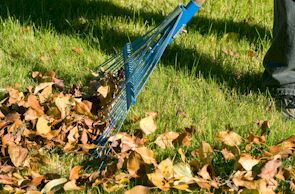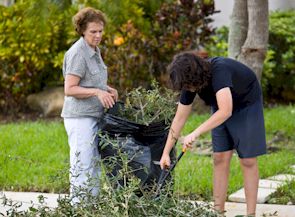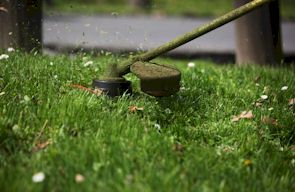Yard Waste
Up to 40 percent of waste taken to the Ordot Dump is yard waste, according to the 2006 Guam Integrated Solid Waste Management Plan. Guam residents are beginning to realize the benefits keeping this yard waste out of the trash and in their yards. Composting and grasscycling allow residents to manage their own yard waste, producing a valuable soil supplement that helps increase the fertility of Guam’s tropical soils.

What about brush and limbs?
You can take green waste, including brush and limbs, to Primo's Northern Hardfill in Yigo and to Pacific Soils and Compost for disposal for a fee.
The green waste and wood waste are ground into mulch, which is made available to residents for free.

Grasscycling
Grasscycling is the natural recycling of grass by simply leaving clippings on the lawn when trimming. Grass clippings decompose quickly, returning valuable nutrients to the soil.
Grasscycling saves time, money, and the resources needed to dispose of the clippings as garbage. You’ll reduce the amount of time needed to cut your lawn because you won’t need to rake up clippings, or drag bags of grass to the curb. However, you may need to mow a little more often. Grasscycling provides an alternative to burning grass clippings, reducing air pollution. Grasscycling provides beneficial organic material to your lawn, reducing the need for chemical fertilizers. Grasscycling reduces the amount of yard waste that needs to be disposed of in landfills. Space in the Ordot Dump is better used for waste that cannot be recycled while your lawn will benefit from the clippings.
You don’t need any special equipment to grasscycle, simply do the following:
- Cut before the grass gets too high, cutting no more than one-third of the grass blade.
- Trim when the grass is dry. If it’s wet when you trim, the trimmer can make ragged cuts on the blades of grass or grass clippings can clump together, making them take longer to decompose.

Composting
Composting is a managed process that speeds the natural decomposition of organic materials into soil amendment. It does this by providing an ideal environment for bacteria and other decomposing organisms to work.
Composting in your backyard carries out part of the earth's biological cycle of growth and decay. It’s a great way to manage your yard waste and kitchen scraps, and will reduce the volume of garbage sent to the Ordot Dump.
Composting simply manages the decay process to make it proceed more quickly. This is done by balancing food, water, and air in the compost pile to favor the growth of the soil organisms, bacteria, mold fungi, beetles, centipedes and earthworms that decompose complex organic compounds into simpler substances, creating a rich, organic soil-like material called humus.

Learn More:


 PAY ONLINE
PAY ONLINE
